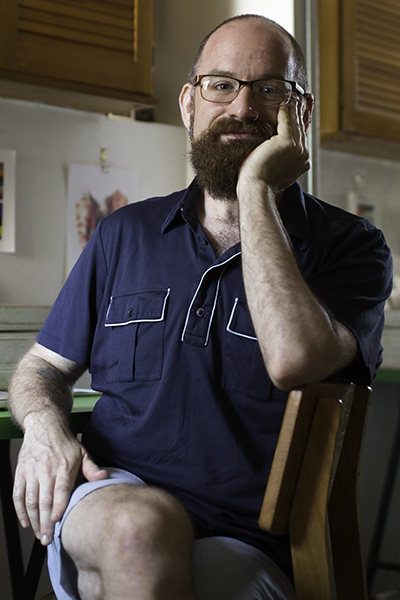Dear reader: maybe you already know inheritance is vexed by paradox. Boon or burden, boon and burden? Each of us enters Johnson’s book through that singular, seemingly never settled and always unsettling noun, holding a small flat object labeled Inheritance. A thing made and possessed by another, and now — is it really yours? A thing given, but was it freely chosen? “Extraordinary limitation,” Johnson writes, “playing freedom.” Keeping itself free of any single relation to inheritance allows the book to open slowly into plurality.
Restless, improvisatory, Johnson favors no single subject matter or mode. He is a poet of theory and memory, of essay and anecdote, of ode and aubade, of self-portraiture and landscape, of deconstruction and sex. His poems are rangy in form — prose, erasure, projective, epistolary, ekphrastic, even a pantoum and a sonnet — and equally rangy in scene and setting — rural Virginia, D. C. and NYC, heterosexual family, queer relation. The book’s structure and layout underscore this restlessness: six unnumbered sections, most prefaced by a single poem, itself both prefaced and followed by photos cut into thin strips.
The book’s overall unity might feel elusive at first because the visuals are a bit jittery, and the book’s many sections are brief, most not more than seven short poems. But the unity of Johnson’s writing, the assurance of its page presence, should be immediately apparent. I hesitate to write “voice,” since these poems insist on being read as writing, and by that I mean they ask us to experience their writing the way live music is both the physical performance of song and the transporting song itself. Live song, live thought. “Light that sings through me,” he writes, “So I’m singing.”
His is performative language, sensual and intelligent. It acknowledges both its own constructedness and the sociality of embodied experience, and throughout the book maintains a vivid mix of the personal and impersonal, the individual and collective, the vernacular and the theoretical. “Perhaps,” Johnson quips, “gender is my greatest product.” And indeed, Johnson joins an incredible generation of Black queer poets — one that includes Xan Phillips, Rickey Laurentiis, Philip B. Williams, and Justin Philip Reed — in signifying upon the capacious Black experimental lyric tradition of poets as different as Dawn Lundy Martin, Carl Phillips, M. NourbeSe Philip, Douglas Kearney, Harmony Holiday, Danez Smith, Evie Shockley, Terrance Hayes, and Fred Moten. And in that sense, Inheritance is singular evidence of Johnson’s deep listening to this tradition “wherein our music compliments and holds close each other’s sound.”
In a book this various, you can find your own through-line; in a book this rich and resonant, you can find a new through-line with each subsequent reading. Over time, I found myself tracking, anticipating, and being moved by Johnson’s pattern of returning to memories of the speaker’s grandparents and the landscape of the rural South, as in the poem “Virginia Slim.” But your through-line will likely be different, and with a book this good, you can trust the poems will lead you somewhere new with each reading. Often, I find myself all day worrying like a smooth stone the feeling or meaning of a single phrase or line. Yesterday: “lonely as a dog with the whole world inside.” Today: “I counted the pines and put my voice inside them.” Always: the vexed question of inheritance, the claim that “this is yours.”




